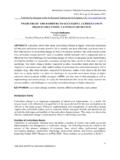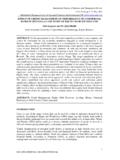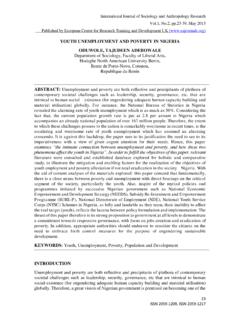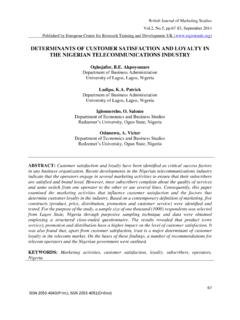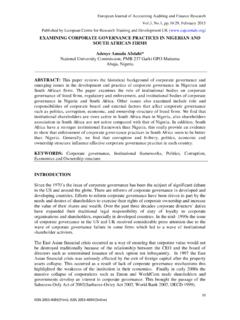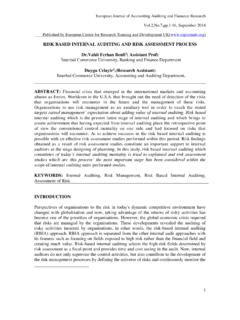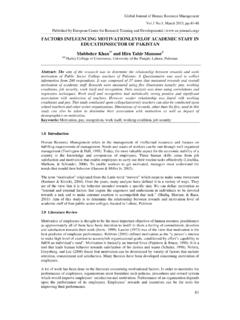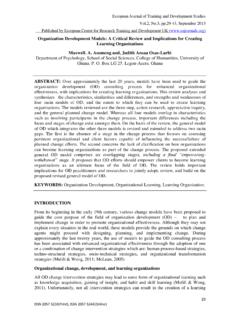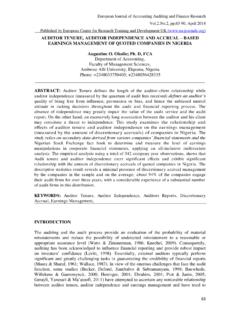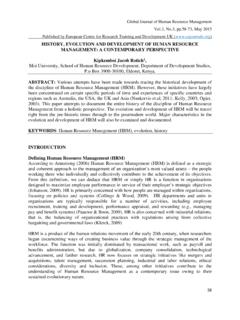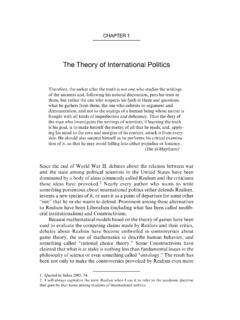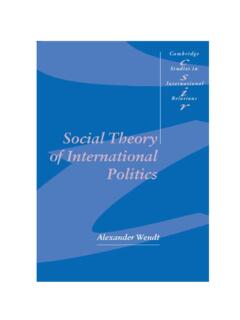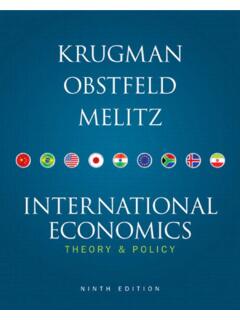Transcription of THE THEORY OF HEGEMONIC STABILITY, HEGEMONIC …
1 Global Journal of Political Science and Administration , , , December 2015. ___Published by European Centre for Research Training and Development UK ( ). THE THEORY OF HEGEMONIC STABILITY, HEGEMONIC POWER AND. international POLITICAL ECONOMIC STABILITY. Assoc. Prof. Noor Mat Yazid, Programme of international Relations, School of Social Sciences, Universiti Malaysia Sabah, Kota Kinabalu, Malaysia ABSTRACT: This paper discusses the importance of the THEORY of HEGEMONIC stability in understanding the stability and instability in the international political economy. According to the THEORY of HEGEMONIC stability, the role played by a HEGEMONIC power is very importance in creating stability in international politics and economy.
2 Without strong hegemon, the creation of international stability is impossible. The secondary data since early twentieth century was used in analysing the relationship between role of the HEGEMONIC power and international stability. The study concludes that the HEGEMONIC power was very importance in creating stability in international political economy. The political instability and economic depression in the decades before Second World War closely related with the absence of strong HEGEMONIC power in the international system. Great Britain was very weak (during the period 1919-1939) and the United States refused to take the role as a new HEGEMONIC power. The League of Nationswas not well function in the 1930s because of the lack of HEGEMONIC power.
3 The better and stable situation in international politics and economy after 1945 was strong influenced by the role played by the United States as a new HEGEMONIC power. The international institution is impossible to run smoothly without strong support by a HEGEMONIC power. KEYWORDS: THEORY Of HEGEMONIC Stability, HEGEMONIC Power, Great Britain, The United States Of America, international Institution, international Stability. INTRODUCTION. The THEORY of HEGEMONIC Stability is important in understanding the stability and instability in the international political economy. According to the THEORY of HEGEMONIC stability, the role played by a HEGEMONIC power is very importance in creating stability in international politics and economy.
4 Without strong HEGEMONIC power, the creation of international stability is impossible. The empirical data since early twentieth century was used in analysing the relationship between role of the HEGEMONIC power and international stability. This paper emphasisesthree main discussions. First, the basic concept of THEORY of HEGEMONIC Stability; secondly, the important of a strong power in international structure and relations to the stability and instability and, finally the role of HEGEMONIC power in regional level with references to the Western Europe, North East Asia and South East Asian region. This paper concludes that a HEGEMONIC power is very important for international political economy stability.
5 Without a strong HEGEMONIC power the stability in economics and politics is impossible. 67. ISSN 2054-6335(Print), ISSN 2054-6343(Online). Global Journal of Political Science and Administration , , , December 2015. ___Published by European Centre for Research Training and Development UK ( ). The important of HEGEMONIC Power in the international Stability. The THEORY of HEGEMONIC Stability (THS) is a significant THEORY in understanding the roles played by the HEGEMONIC power and the relations with the economic development and political stability in the international structure. The key point in the THEORY of HEGEMONIC Stability is that there must be a HEGEMONIC power, a single dominant power in the international system to ensure international economic and political Only a HEGEMONIC power can establish the international rules that facilitate orderly exchanges amongst countries and should punish transgressors with predictable penalties.
6 A transgressor should be punished because, without punishing, it might threaten the existing hegemony. The successful punishment of any transgressor is also a symbol of strength of a HEGEMONIC power. The punishment of transgressors is important for strengthening and maintaining the position of a HEGEMONIC power. The HEGEMONIC power punishment towards the aggressor is a symbol of the strength of a HEGEMONIC power in maintaining the international stability. It is a character of HEGEMONIC strength and its stability, where the HEGEMONIC power can exert his control upon the international system that it is part of and play an effective role. The role of a hegemony power is leadership in the international system.
7 She is a stabiliser and the strongest power among all states in the international structure of the state system. After World War I and until the outbreak of World War II in 1939 (the period from 1919-1939) the international political-economy system was changed. Germany had been defeated in World War I, but Great Britain was too weak to play the role as a HEGEMONIC power. During this period international relations and the international political economy was not stable because of the absence of a HEGEMONIC power to dominate and regulate the international system. The United States refused to take the role of the new HEGEMONIC power to replace Britain during this period of 1919 to 1939.
8 Thus from early twentieth century until the emergence of a new HEGEMONIC power after the end of World War II was a period of absence HEGEMONIC ' with no HEGEMONIC power to control the international stability. A HEGEMONIC power has the incentive to provide the public good' (shared values from which everyone who has access to them benefits, even if not everyone contributes to their preservation or creation), as it has the greatest power in perpetuating the existing international system that gives him the dominant status. Public good or a secure and stable condition can only be provided by a HEGEMONIC state; he has the ability in providing the public good' because he is in the strongest position and has ability in terms of military, economy and politics .
9 HEGEMONIC power can provide public good, ensure order and security. Security and stable economic and politics are possible with strong HEGEMONIC power. The two decades of periods from 1919 to 1939 was an unstable period because of the absence of a HEGEMONIC power. The period was a transition period of an emerging 1. Kindleberger, Charles, P., Dominance and Leadership in the international Economy: Exploitation, Public Goods, and Free Rides, international Studies Quarterly, vol. 25, June 1981, p. 247. Robert Gilpin moves beyond Kindleberger's conception of altruism and develops an interest-based explanation of leadership Gilpin defines the position of a country within the international economy along two dimensions; political economy power and efficiency.
10 Political-military power indicates the quantity of influence a state possessesover the international economic regime. More detailed for the two versions of the HEGEMONIC stability THEORY , see Webb, Michael, C., and Krasner, Stephen, D., HEGEMONIC Stability THEORY : An Empirical Assessment , Review of international Studies, 1989, vol. 15, no. 2, pp. 184-186, and see also Lake, David, A., 1983, international Economic Structures and American Economic Policy, 1887-1934, World politics , vol. 35, no. 4, July 1983, pp. 519-521. 68. ISSN 2054-6335(Print), ISSN 2054-6343(Online). Global Journal of Political Science and Administration , , , December 2015. ___Published by European Centre for Research Training and Development UK ( ).
